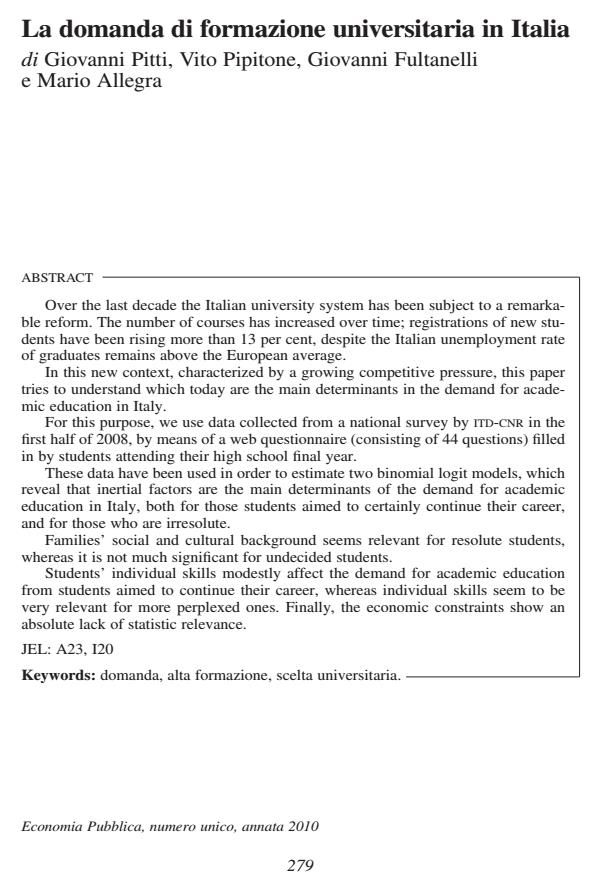La domanda di formazione universitaria in Italia
Titolo Rivista ECONOMIA PUBBLICA
Autori/Curatori Giovanni Pitti, Vito Pipitone, Giovanni Fultanelli, Mario Allegra
Anno di pubblicazione 2012 Fascicolo 2010/1-6 Lingua Italiano
Numero pagine 23 P. 279-301 Dimensione file 489 KB
DOI 10.3280/EP2010-001012
Il DOI è il codice a barre della proprietà intellettuale: per saperne di più
clicca qui
Qui sotto puoi vedere in anteprima la prima pagina di questo articolo.
Se questo articolo ti interessa, lo puoi acquistare (e scaricare in formato pdf) seguendo le facili indicazioni per acquistare il download credit. Acquista Download Credits per scaricare questo Articolo in formato PDF

FrancoAngeli è membro della Publishers International Linking Association, Inc (PILA)associazione indipendente e non profit per facilitare (attraverso i servizi tecnologici implementati da CrossRef.org) l’accesso degli studiosi ai contenuti digitali nelle pubblicazioni professionali e scientifiche
Over the last decade the Italian university system has been subject to a remarkable reform. The number of courses has increased over time; registrations of new students have been rising more than 13 per cent, despite the Italian unemployment rate of graduates remains above the European average. In this new context, characterized by a growing competitive pressure, this paper tries to understand which today are the main determinants in the demand for academic education in Italy. For this purpose, we use data collected from a national survey by ITD-CNR in the first half of 2008, by means of a web questionnaire (consisting of 44 questions) filled in by students attending their high school final year. These data have been used in order to estimate two binomial logit models, which reveal that inertial factors are the main determinants of the demand for academic education in Italy, both for those students aimed to certainly continue their career, and for those who are irresolute. Families’ social and cultural background seems relevant for resolute students, whereas it is not much significant for undecided students. Students’ individual skills modestly affect the demand for academic education from students aimed to continue their career, whereas individual skills seem to be very relevant for more perplexed ones. Finally, the economic constraints show an absolute lack of statistic relevance.;
Keywords:Domanda, alta formazione, scelta universitaria
Jel codes:A23, I20
Giovanni Pitti, Vito Pipitone, Giovanni Fultanelli, Mario Allegra, La domanda di formazione universitaria in Italia in "ECONOMIA PUBBLICA " 1-6/2010, pp 279-301, DOI: 10.3280/EP2010-001012